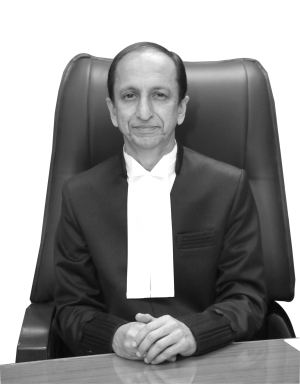
Meet Justice Atul Sharachchandra Chandurkar and his Notable Judicial decisions
Justice Atul Sharachchandra Chandurkar, born on April 7, 1965, is a distinguished jurist currently serving as a judge of the Supreme Court of India, having taken oath on May 30, 2025. He completed his schooling at St. Vincent’s High School, Pune, graduated from Ness Wadia College, and earned his law degree from I.L.S. Law College, Pune. After enrolling as an advocate in 1988, he began his legal practice in Mumbai under Senior Advocate B.N. Naik before shifting to Nagpur in 1992, where he handled a wide range of civil, constitutional, and municipal matters. Justice Chandurkar is also an author of two legal books on municipal and rent control law in Maharashtra.
He was elevated as an Additional Judge of the Bombay High Court on June 21, 2013, and became a permanent judge in March 2016. He served as the seniormost puisne judge at the Nagpur bench of the Bombay High Court prior to his elevation to the Supreme Court.
Landmark Judgments
1. Information Technology Rules (2023 Amendments)
Justice Chandurkar played a pivotal role as the deciding judge in a split verdict on the constitutional validity of the 2023 amendments to the Information Technology Rules. These amendments empowered a government-appointed Fact Check Unit (FCU) to label online content related to government business as "fake" or "misleading." Justice Chandurkar concurred with Justice Gautam S. Patel in striking down the amended rules, holding them unconstitutional and violative of Articles 14 and 19(1)(a) and 19(1)(g) of the Constitution, thus reinforcing the protection of digital rights and free speech.
2. Hijab and Dress Code Case (2024)
In June 2024, Justice Chandurkar led a division bench that dismissed a plea by nine students challenging a college dress code in Chembur, which banned hijabs and other religious identifiers. He held that the college’s instructions did not violate fundamental rights to freedom of expression or religion, upholding the institution’s autonomy in setting reasonable regulations.
3. Land Acquisition and Government Policy
Justice Chandurkar presided over cases involving significant land policy decisions, including a stay on the Maharashtra government’s move to reclaim over 116 acres of land in Charkop, Kandivali (West), originally allotted for industrial purposes. His interventions ensured due process and fairness in state actions affecting property rights.
4. Academic Discipline and Student Rights
He dismissed a plea by a Dalit PhD student against suspension by the Tata Institute of Social Sciences (TISS), finding the disciplinary action justified based on repetitive misconduct and activities deemed anti-national.
5. Heritage Protection
Justice Chandurkar also directed the Maharashtra government to clarify the heritage status of VD Savarkar’s residence, ordering that the property’s status should not be altered until further notice, highlighting his sensitivity to heritage and cultural issues.
Judicial Philosophy
Justice Chandurkar is recognized for his judicious reasoning, deep constitutional insight, and balanced approach to fundamental rights and public policy. His landmark rulings, particularly on digital rights, free speech, and institutional autonomy, have reinforced the judiciary’s role in safeguarding constitutional liberties in contemporary India.












comments